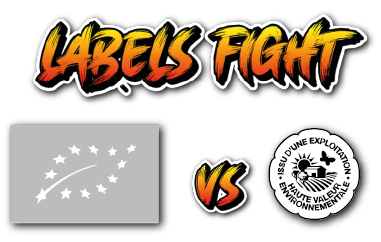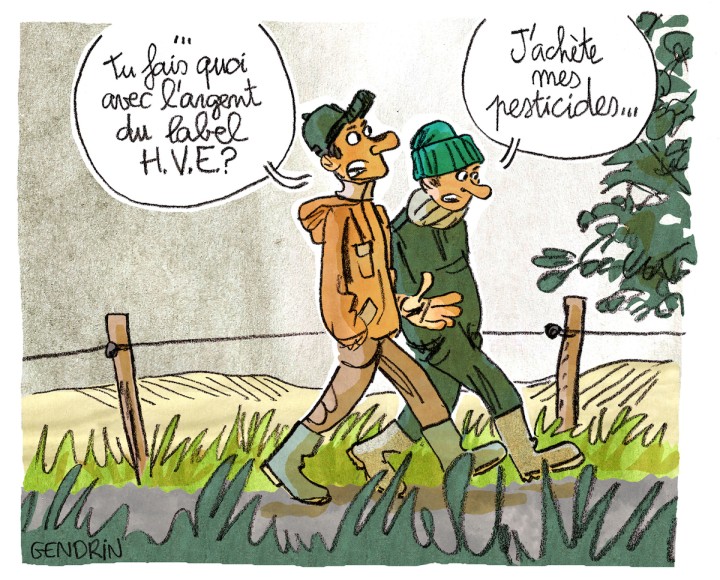SAUVONS LA ORGANIC

A collective has been formed to defend organic farming, and because enough is enough, HOPSTORE joins them. What about you?
Where does the HVE label come from?
We're at the Grenelle de l'environnement in 2007, and it's clear that respect for biodiversity and water resources needs to be taken more into account in agricultural practices. Unfortunately, these two points are not part of the Organic label, whose specifications cannot be changed by a wave of a magic wand, as it has been a European label since 1991. The proposal was therefore made to create a new, Franco-French label: Haute Valeur Environnementale, which came into force in 2012.
To get the full picture, this label is divided into 3 levels:
- Level 1: Compliance with current agricultural regulations
- Level 2: invites you to recognize and identify areas of biodiversity on the farm (hedges, etc.).
- Level 3: This is the certification level, for a period of 3 years, and enables the farmer to use the HVE logo. It comprises two possible options
- OPTION A: "consists of a set of specifications including requirements in terms of biodiversity, phytosanitary strategy, fertilization and irrigation management. For each category, various indicators assess the farm's " environmental performance "(source).
- OPTION B: this option favors farmers who are doing well, since it looks at the ratio - which must not exceed 30% - between input costs and farm sales.
All the details are here. Enjoy
HVE: a very low-value label

This label is too undemanding! At least 10% of the farm's total surface area must be dedicated to biodiversity to qualify for the label. These biodiversity zones can be hedges, grassy strips, beehives, etc. In short, it's enough to change almost nothing and simply count what already exists to claim to have a "High Environmental Value" farm. It's a disgrace and an abuse.
And on this point, there's no debate:
The Court notes that, in all areas, the action taken by the Ministry of Agriculture and Food Sovereignty is unable to meet its stated ambitions. It alerts the public authorities to the lack of communication on the beneficial impacts of Organic, and above all to the illegibility of labels, which is contributing to the drop in food purchases Organic in 2021 in the face of growing competition from less demanding "green" labels - such as the "high environmental value" (HVE) label.
Cour des Comptes report on support for organic farming
So you might say, as some people do, "yes, but it's a start..." Well, no, not even that.
"The problem is that the HVE label, which was originally conceived as a step towards Organic, has become an end in itself for many players. And yet, it remains insufficient in the face of the ecological challenge. "
Cécile Claveirole, in charge of the Agriculture network at France Nature Environnement
Abuse and Unfair Competition
This label could have been interesting, as it takes into account factors that are sorely lacking in the Organic label.
Consumer abuse
But it doesn't take much to put a pretty logo on products and fool consumers into believing that the practices they represent are virtuous: "The name HVE conjures up a notion of excellence that we're not sure is actually there," says Charles Pernin, general delegate of the Synabio trade association. There's a risk of confusion for consumers."
With this well-marked logo, consumers are tempted to think that the products are respectful of our health and our environment. In fact, the association's website states that:
"At the end of the certification process, the "High Environmental Value" label certifies estates and farms that :
- Atencourage biodiversity to provide a complementary network for crops
- Preserve soil life to keep plots alive and fertile
- Develop positive synergies with the crops' natural environment
- Encourage the development of useful fauna, including precious pollinators".
A huge joke.
This is all the more true given that selling prices are much lower than those of products bearing the Organic label (logically, since they do not have the same characteristics). In these times of inflation, HVE products are welcomed by our wallets: by buying an HVE product, the consumer has the impression of supporting an approach based on quality and respect at a reasonable cost, when in fact this is not the case at all!
And that's not all!
Public funds that could go to Organic
Although the label has struggled to get off the ground, the government has announced an ambitious target of 50,000 committed farms by 2030. And to encourage more farmers to follow this path, the 2021 finance law provides for a tax credit worth 2,500 euros aimed at HVE-certified farmers. Total cost to public finances: 76 million euros. That's all there is to it!
At the same time, the Cour des Comptes (French National Audit Office) points out that "the Common Agricultural Policy (CAP) aid that France devotes to agriculture Organic does not meet the objectives it has set itself. Half of the envelope was consumed in the first year of the programming started in 2015. In 2017, the aid for maintaining Organic agriculture was abolished, even though it remunerated the environmental services of these farms. As aresult, a quarter of farms Organic do not receive CAP aid. "(Court of Auditors report).
What a shame! When you think that France's objectives are to reach 18% of agricultural land under Organic by 2027 and 25% of land under Organic at EU level by 2030! But then again, we're probably not that far off the mark...
In short, we must react
We're having a hard time of it, and maybe you are too: the Organic sector has been slowing down for several months now. But not HVE! A 7% decrease for the former and an 8% increase for the latter (figures presented in the SURLEFRONT program on France 5)!!!! If we don't want it to disappear, we have to react!
The Organic label isn't perfect, and it certainly has its shortcomings. But it is still the most demanding, and points in the right direction: producers must be encouraged to make these efforts, and consumers must be informed of what exists.
At the same time, let's raise our voices: a collective has been set up by 3 industry professionals Organic : Simon Le Fur (Aventure Organic, wholesaler), Philippe Delran (Biolinéaires, publisher), Jean-Christophe Bernard (MoRice, brand Organic) to say STOP to the contempt for Organic and we join them in their fight.
The Collectif's demands ":
"That the Ministry of Agriculture once again consider the Organic sector as a business with a future, and propose a fair emergency support plan, in line with the support plans for conventional sectors, i.e. between €150m and €300m ".
For your information, here are the budgets allocated to Organic:
- 10m emergency aid for Organic announced at Salon de l'Agriculture +.
- 1.25m of education/advertising +.
- a €60m envelope - non-exclusive Organic - for farms hit by climatic disasters: what do we mean by "climatic disaster"? And for how long...
- + an obligation for public establishments to offer at least 50% "quality" products - err... - and 20% Organic products, i.e. a total demand-side support of around €120m: besides, why not directly offer 70% Organic/Biodynamic products...?
As youcan see, these funds are often indirect - not in farmers' pockets - hypothetical and scattered. A far cry from the tax credit directly allocated to HVE-certified farmers.
To join us:
- A petition is online here
- A downloadable leaflet with QR Code - which you will also find on the cards sent by HOPSTORE - will enable you to communicate and invite your ecosystem to take part in this movement.
Because the survival of many businesses, including ours, depends on it, and because abuses are becoming unbearable, we're mobilizing to save agriculture Organic. Join us!

